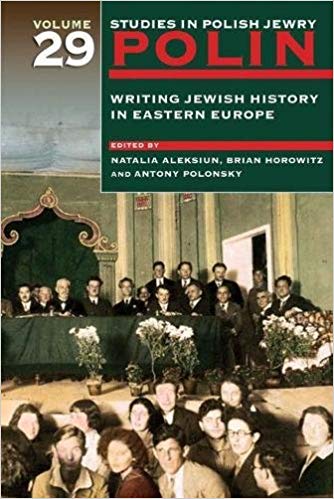Like Jews Like Endeks Poland Was Bad Hypocrisy Aleksiun

Polin, Volume 29, by Natalie Aleksiun, Brian Horowitz, and Antony Polonsky (eds.) 2017
Includes Insights into Jewish Endek-Mirror-Image Attitudes; the Bund; Jews Flee the USSR for Poland (Anti-Semitism Hypocrisy); and the POLIN Museum in Warsaw
Like other volumes of the POLIN series, this one is often a mile wide and an inch deep. It does, however, contain some interesting information, which I now bring to the reader’s attention.
“UNDERSTANDING THE SOUL”: ENDEKS HAVE BEEN BERATED FOR POSITIONS ALSO HELD BY RESPECTABLE JEWS
Traditionalist Poles have often, in Jewish publications, been portrayed as a primitive people for suggesting that even Polonized Jews should not be writing about Polish history, or Polish Catholicism, as they are incapable of understanding the Polish soul. Perhaps this matter touches on what nowadays is called cultural misappropriation. Although they are never ever condemned for it, Jews felt exactly the same way about Poles! Author Rachel Manekin, writing about Isaac Bernfeld [a Galician Jew who was the active in 1881 and who was the brother of a historian of the Haskalah (Jewish enlightenment)], comments, “Bernfeld conceded that there were indeed Polish authors like Tadeusz Czacki who had written about the Jews, but he doubted the ability of Christians ‘who know nothing about Jewish life, to gaze inward into the national spirit that flutters within us, and which is the inner spirit that animates people’s histories.’ The Christians were mere spectators and thus were unable to see the full picture.” (pp. 77-78).
THE BUND: A MAINSTREAM JEWISH POLITICAL PARTY HOSTILE TO POLAND AND CONGENIAL TO COMMUNISM
Citing Yiddish sources, Samuel Kassow writes, “Other historians, such as Roni Gechman and Gertrud Pickhan, stress just how central REVOLUTIONARY MARXISM and INTERNATIONALISM were to the Bund…Gertrud Pickhan also stressed the critical role of RADICAL INTERNATIONALISM in the activity and evolving self-image of the Polish Bund.” (p. 135, emphasis added).
Kassow (p. 136) claims that the Bund “rejected Communism”, but, other than a dislike of the Soviet-promoted assimilationist goals for Jews, it is unclear, semantics aside, how the Bund’s acknowledged “revolutionary Marxism” and “radical internationalism” were supposed to be substantially different from the essence of Communism.
Finally, although, according to Kassow, the Bund was supposed to become more congenial to Poland during the course of the Second Republic (1918-1939), if only for opportunistic reasons, this does not change the fact, mentioned by Kassow, that, “…the old Bund had largely opposed Polish independence…” (p. 136).
RELIGIOUS JEWS IN THE USSR FLEE TO POLAND: HYPOCRITICAL DOUBLE STANDARD ON ANTI-SEMITISM
Glenn Dynner writes, “In the Soviet Union, Jewish religious functionaries and entire yeshiva student bodies were intimidated, silenced, and degraded to the point that many felt compelled to sneak themselves and their families across the border into the relative freedom and safety of Poland. The crisis intensified with Stalin’s ascendancy in 1926.” (p. 298).
The foregoing are interesting statements, because the “Jews had it better in the USSR” exculpation is often used as a standard excuse for Polish Jews collaborating with the Soviets, against Poles, in 1939-on and again in 1944-on. The Jews gave the Soviet Union a pass. Had Poland done half these things, we would not have heard the end of it!
THE STANDARD BLAME-EVERYTHING-ON-POLES AND JEWISH-WRONGDOING-DENIALISM
Polish Jew Ireneusz Krzeminski (pp. 425-on) has the same-old, same-old Judeocentric standard narrative about Polish anti-Semitism. In addition, Krzeminski (p. 427) takes the obligatory pot shots at RADIO MARYJA, and runs-down Poles for not embracing the LEWAK agenda, including feminism. (p. 442).
As is almost always the case, Jewish authors refuse to admit the undeniable fact of past Jewish crimes, notably that of the ZYDOKOMUNA (Judeo-Bolshevism). In his discussion of the POLIN Museum in Warsaw, Antony Polonsky (pp. 346-347) alludes to the old, canned exculpatory arguments. These are: “Look at all the non-Jewish Communists” (as if a Jewish murderer should go free because there are also gentile murderers), “Jews had it bad” (which is the same as the “Germans had it bad” exculpatory argument for Germans supporting Hitler and his crimes), and the well-worn and creative “Jewish Communists were not really Jews”, which is as ridiculous as it is false. (It is like saying that a lot of Jewish Nobel Prize winners are “not really Jews.”)
To see a series of truncated reviews in a Category click on that Category:
- All reviews
- Anti-Christian Tendencies
- Anti-Polish Trends
- Censorship on Poles and Jews
- Communization of Poland
- Cultural Marxism
- German Guilt Dilution
- Holocaust Industry
- Interwar Polish-Jewish Relations
- Jewish Collaboration
- Jewish Economic Dominance
- Jews Antagonize Poland
- Jews Not Faultless
- Jews' Holocaust Dominates
- Jews' Holocaust Non-Special
- Nazi Crimes and Communist Crimes Were Equal
- Opinion-Forming Anti-Polonism
- Pogrom Mongering
- Poland in World War II
- Polish Jew-Rescue Ingratitude
- Polish Nationalism
- Polish Non-Complicity
- Polish-Ukrainian Relations
- Polokaust
- Premodern Poland
- Recent Polish-Jewish Relations
- The Decadent West
- The Jew as Other
- Understanding Nazi Germany
- Why Jews a "Problem"
- Zydokomuna